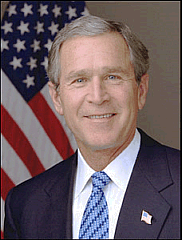

mailto: payer@payer.de
Zitierweise / cite as:
Payer, Margarete <1942 - >: Informationsmarktverzerrung durch Fundamentalismus am Beispiel der USA. -- Kapitel 5: Information und Zensur. -- 4. Kämpfer für die Freiheit der Information. -- Fassung vom 2005-03-23. -- URL: http://www.payer.de/fundamentalismus/fundamentalismus054.htm
Erstmals publiziert: 200-03-23
Überarbeitungen:
Anlass: Lehrveranstaltung an der Hochschule der Medien Stuttgart, Sommersemester 2005
Copyright: Dieser Text steht der Allgemeinheit zur Verfügung. Eine Verwertung in Publikationen, die über übliche Zitate hinausgeht, bedarf der ausdrücklichen Genehmigung des Verfassers.

Dieser Text ist Teil der Abteilung Länder und Kulturen von Tüpfli's Global Village Library
Selbstverständlich erhebt die Auswahl der Organisationen keinen Anspruch auf Vollständigkeit. Die behandelten Organisationen sind wegen ihrer überragenden Bedeutung oder als typische Beispiele gewählt.
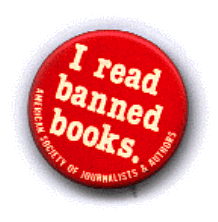
Abb.: I read banned books - Button der American Society of Journalists & Authors
[Bildquelle:
http://home.mtholyoke.edu/~burnsm/buttons/. -- Zugriff am 2005-03-14]
Webpräsenz: http://www.freeexpression.org/. -- Zugriff am 2005-03-15
Eine Allianz von Organisationen für Freiheit der Äußerung. Mitglieder sind (Stand: 2005-03-15):
Webpräsenz: http://www.ala.org/Template.cfm?Section=if. -- Zugriff am 2005-03-15
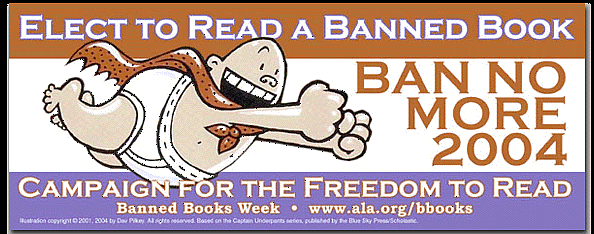
Abb.: Lesezeichen für Kinder, Banned Books Week 2004 [dargestellt ist Captain
Underpants aus der glichnamigen, oft angegriffenen Reihe von Dav Pilkey]
[Bildquelle:
http://www.ala.org/ala/oif/bannedbooksweek/bbwkit/bookmarks/bookmarks.htm.
-- Zugriff am 2005-03-15]
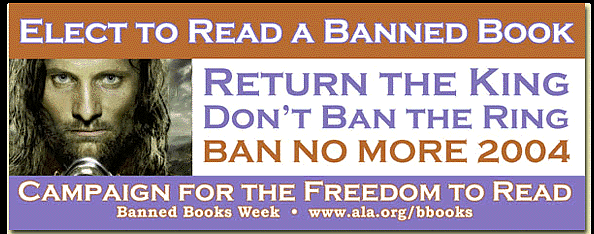
Abb.: Lesezeichen für Jugendliche, Banned Books Week 2004 [bezieht sich auf J.
R. R. Tolkien: Lord of the Rings]
[Bildquelle:
http://www.ala.org/ala/oif/bannedbooksweek/bbwkit/bookmarks/bookmarks.htm.
-- Zugriff am 2005-03-15]
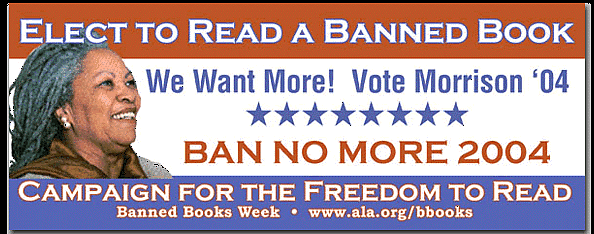
Abb.: Lesezeichen für Jugendliche, Banned Books Week 2004 [gemeint ist Toni
Morrison, Literaturnobelpreisträgerin 1993, siehe unten]
[Bildquelle:
http://www.ala.org/ala/oif/bannedbooksweek/bbwkit/bookmarks/bookmarks.htm.
-- Zugriff am 2005-03-15]
"Toni Morrison is an African-American author, born Chloe Anthony Wofford, February 18, 1931 in Lorain, Ohio. In 1965 she became a senior editor for Random House in New York City. She was also a professor at SUNY Albany. Morrison achieved a Master of Arts degree from Cornell University in 1955. Her novel Beloved won the Pulitzer Prize for fiction in 1988. This story describes a slave who found freedom, but killed her infant daughter to save her from a life of slavery.
Morrison was an important player in the battle to open the canon of English and comparative literature. Her efforts durring the 1960's and 1970's helped break down the segregation of literature from small minority subsets (African-American Literature or Hispanic Literature). Many now include Morrison's own work in the canon of American Literature.
She won the National Books Critics Award for Song of Solomon, a tale of the renunciation of materialism and the strength of brotherly love. She was awarded the Nobel Prize in Literature in 1993, the first African-American woman to receive this prize.
She is currently the Robert F. Goheen Professor of the Humanities at Princeton University."
[Quelle: http://en.wikipedia.org/wiki/Toni_Morrison. -- Zugriff am 2005-03-15]
Seit 1982 veranstaltet die ALA jährlich in der letzetn Septemberwoche eine Banned Books Week.
"Why Banned Books Week? Banned Books Week: Celebrating the Freedom to Read is observed during the last week of September each year. Observed since 1982, the annual event reminds Americans not to take this precious democratic freedom for granted.
Banned Books Week (BBW) celebrates the freedom to choose or the freedom to express one’s opinion even if that opinion might be considered unorthodox or unpopular and stresses the importance of ensuring the availability of those unorthodox or unpopular viewpoints to all who wish to read them. After all, intellectual freedom can exist only where these two essential conditions are met. As the Intellectual Freedom Manual (ALA, 6th edition, p. xiii) states:
“Intellectual freedom can exist only where two essential conditions are met: first, that all individuals have the right to hold any belief on any subject and to convey their ideas in any form they deem appropriate; and second, that society makes an equal commitment to the right of unrestricted access to information and ideas regardless of the communication medium used, the content of the work, and the viewpoints of both the author and receiver of information. Freedom to express oneself through a chosen mode of communication, including the Internet, becomes virtually meaningless if access to that information is not protected. Intellectual freedom implies a circle, and that circle is broken if either freedom of expression or access to ideas is stifled.”
Each year, the American Library Association (ALA) is asked why the week is called “Banned Books Week” instead of “Challenged Books Week,” since the majority of the books featured during the week are not banned, but “merely” challenged. There are two reasons. One, ALA does not “own” the name Banned Books Week, but is just one of several cosponsors of BBW; therefore, ALA cannot change the name without all the cosponsors agreeing to a change. Two, none want to do so, primarily because a challenge is an attempt to ban or restrict materials, based upon the objections of a person or group. A successful challenge would result in materials being banned or restricted.
Although they were the targets of attempted bannings, most of the books featured during BBW were not banned, thanks to the efforts of librarians to maintain them in their collections. Imagine how many more books might be challenged—and possibly banned or restricted—if librarians, teachers, and booksellers across the country did not use Banned Books Week each year to teach the importance of our First Amendment rights and the power of literature, and to draw attention to the danger that exists when restraints are imposed on the availability of information in a free society.
To assist in planning the weeklong celebration, each year a BBW kit is developed. This kit includes three posters, 100 bookmarks, a button and a Resource Guide, which contains suggested activities and ideas for a BBW celebration. Moreover, the Resource Guide contains an annotated list of challenged or banned books and is an excellent reference for conducting research on censorship.
Often challenges are motivated by a desire to protect children from “inappropriate” sexual content or “offensive” language. Although this is a commendable motivation, Free Access to Libraries for Minors, an interpretation of the Library Bill of Rights (ALA's basic policy concerning access to information) states that, “Librarians and governing bodies should maintain that parents—and only parents—have the right and the responsibility to restrict the access of their children—and only their children—to library resources.” Censorship by librarians of constitutionally protected speech, whether for protection or for any other reason, violates the First Amendment.
As Supreme Court Justice William J. Brennan, Jr., in Texas v. Johnson, said most eloquently:
“If there is a bedrock principle underlying the First Amendment, it is that the government may not prohibit the expression of an idea simply because society finds the idea itself offensive or disagreeable.”
If we are to continue to protect our First Amendment, we would do well to keep in mind these words of Noam Chomsky:
“If we don't believe in freedom of expression for people we despise, we don't believe in it at all.”
[Quelle: http://www.ala.org/ala/oif/bannedbooksweek/backgroundb/background.htm. -- Zugriff am 2005-03-15]
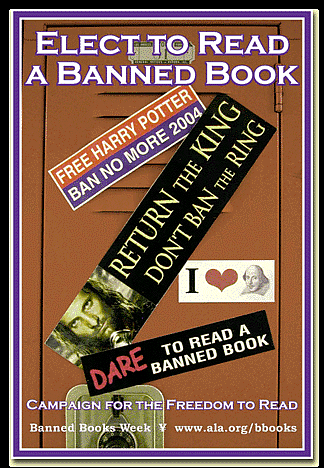
Abb.: Plakat für Jugendliche Banned Books Week 2004
[Bildquelle:
http://www.ala.org/ala/oif/bannedbooksweek/bbwkit/youngadultposter/youngadultposter.htm.
-- Zugriff am 2005-03-15]
Library Bill of Rights The American Library Association affirms that all libraries are forums for information and ideas, and that the following basic policies should guide their services.
- Books and other library resources should be provided for the interest, information, and enlightenment of all people of the community the library serves. Materials should not be excluded because of the origin, background, or views of those contributing to their creation.
- Libraries should provide materials and information presenting all points of view on current and historical issues. Materials should not be proscribed or removed because of partisan or doctrinal disapproval.
- Libraries should challenge censorship in the fulfillment of their responsibility to provide information and enlightenment.
- Libraries should cooperate with all persons and groups concerned with resisting abridgment of free expression and free access to ideas.
- A person’s right to use a library should not be denied or abridged because of origin, age, background, or views.
- Libraries which make exhibit spaces and meeting rooms available to the public they serve should make such facilities available on an equitable basis, regardless of the beliefs or affiliations of individuals or groups requesting their use.
Adopted June 18, 1948.
Amended February 2, 1961, and January 23, 1980,
inclusion of “age” reaffirmed January 23, 1996,
by the ALA Council.[Quelle: http://www.ala.org/ala/oif/statementspols/statementsif/librarybillrights.htm. -- Zugriff am 2005-03-15]
DECLARACIÓN DE LOS DERECHOS DE LAS BIBLIOTECAS La Asociación de Bibliotecas de los Estados Unidos (American Library Association) afirma que todas las bibliotecas son foros abiertos para la información y las ideas, y que las siguientes normas básicas deben dirigir sus servicios.
- Con el fin de satisfacer el interés de sus usuarios y darles acceso a todo tipo de información, toda biblioteca debe poner sus libros y otros recursos a la disposición de todos los integrantes de la comunidad a la cual sirve.
- Toda biblioteca debe proveer información y materiales que representen todos los puntos de vista sobre temas históricos y de actualidad. Ningún material debe ser prohibido ni retirado de circulación por motivos doctrinarios o partidistas.
- En su misión de proveer información sin restricciones, toda biblioteca debe enfrentarse a todo acto y tipo de censura.
- Toda biblioteca debe cooperar con todos los individuos y grupos interesados en oponerse a cualquiera restricción a la libre expresión y el libre acceso a las ideas.
- No se le debe negar a ninguna persona el derecho de usar la biblioteca por motivos de origen, edad, antecedentes personales o punto de vista.
- Toda biblioteca que cuente con espacio disponible para exhibiciones o reuniones pœblicas, debe ofrecerlo en forma equitativa, sin tener en cuenta la creencia o afiliación de los individuos o grupos que soliciten su uso.
Adoptado el 18 de junio 1948. Enmendado el 2 de febrero de 1961 y el 23 de enero de 1980, la inclusión de “edad” reafirmada el 23 de enero de 1996 por el Consejo de la Asociación de Bibliotecas de los Estados Unidos (Council of the American Library Association).
[Quelle: http://www.ala.org/ala/oif/statementspols/statementsif/spanishversion/spanishversion.htm-. -- Zugriff am 2005-03-15]
Code of Ethics of the American Library Association As members of the American Library Association, we recognize the importance of codifying and making known to the profession and to the general public the ethical principles that guide the work of librarians, other professionals providing information services, library trustees and library staffs.
Ethical dilemmas occur when values are in conflict. The American Library Association Code of Ethics states the values to which we are committed, and embodies the ethical responsibilities of the profession in this changing information environment.
We significantly influence or control the selection, organization, preservation, and dissemination of information. In a political system grounded in an informed citizenry, we are members of a profession explicitly committed to intellectual freedom and the freedom of access to information. We have a special obligation to ensure the free flow of information and ideas to present and future generations.
The principles of this Code are expressed in broad statements to guide ethical decision making. These statements provide a framework; they cannot and do not dictate conduct to cover particular situations.
- We provide the highest level of service to all library users through appropriate and usefully organized resources; equitable service policies; equitable access; and accurate, unbiased, and courteous responses to all requests.
- We uphold the principles of intellectual freedom and resist all efforts to censor library resources.
- We protect each library user's right to privacy and confidentiality with respect to information sought or received and resources consulted, borrowed, acquired or transmitted.
- We recognize and respect intellectual property rights.
- We treat co-workers and other colleagues with respect, fairness and good faith, and advocate conditions of employment that safeguard the rights and welfare of all employees of our institutions.
- We do not advance private interests at the expense of library users, colleagues, or our employing institutions.
- We distinguish between our personal convictions and professional duties and do not allow our personal beliefs to interfere with fair representation of the aims of our institutions or the provision of access to their information resources.
- We strive for excellence in the profession by maintaining and enhancing our own knowledge and skills, by encouraging the professional development of co-workers, and by fostering the aspirations of potential members of the profession.
Adopted by the ALA Council
June 28, 1995
[Quelle: http://www.ala.org/ala/oif/statementspols/codeofethics/codeethics.htm. -- Zugriff am 200-03-15]
"Intellectual Freedom and Censorship Q & A “If all mankind minus one were of one opinion, and only one person were of the contrary opinion, mankind would be no more justified in silencing that one person, than he, if he had the power, would be justified in silencing mankind.”— John Stuart Mill, On Liberty“He that would make his own liberty secure, must guard even his enemy from opposition: for if he violates this duty he establishes a precedent that will reach to himself. ”— Thomas Paine, Dissertation On First Principles Of GovernmentWhat Is Intellectual Freedom?Why Is Intellectual Freedom Important?Intellectual freedom is the right of every individual to both seek and receive information from all points of view without restriction. It provides for free access to all expressions of ideas through which any and all sides of a question, cause or movement may be explored.
What Is Censorship?Intellectual freedom is the basis for our democratic system. We expect our people to be self-governors. But to do so responsibly, our citizenry must be well-informed. Libraries provide the ideas and information, in a variety of formats, to allow people to inform themselves.
Intellectual freedom encompasses the freedom to hold, receive and disseminate ideas.
Censorship is the suppression of ideas and information that certain persons—individuals, groups or government officials—find objectionable or dangerous. It is no more complicated than someone saying, “Don’t let anyone read this book, or buy that magazine, or view that film, because I object to it! ” Censors try to use the power of the state to impose their view of what is truthful and appropriate, or offensive and objectionable, on everyone else. Censors pressure public institutions, like libraries, to suppress and remove from public access information they judge inappropriate or dangerous, so that no one else has the chance to read or view the material and make up their own minds about it. The censor wants to prejudge materials for everyone.
How Does Censorship Happen?
Who Attempts Censorship?Censorship occurs when expressive materials, like books, magazines, films and videos, or works of art, are removed or kept from public access. Individuals and pressure groups identify materials to which they object. Sometimes they succeed in pressuring schools not to use them, libraries not to shelve them, book and video stores not to carry them, publishers not to publish them, or art galleries not to display them. Censorship also occurs when materials are restricted to particular audiences, based on their age or other characteristics.
What Is The Relationship Between Censorship And Intellectual Freedom?In most instances, a censor is a sincerely concerned individual who believes that censorship can improve society, protect children, and restore what the censor sees as lost moral values. But under the First Amendment to the United States Constitution, each of us has the right to read, view, listen to, and disseminate constitutionally protected ideas, even if a censor finds those ideas offensive.
How Do Censors Justify Their Demands That Information Be Suppressed?In expressing their opinions and concerns, would-be censors are exercising the same rights librarians seek to protect when they confront censorship. In making their criticisms known, people who object to certain ideas are exercising the same rights as those who created and disseminated the material to which they object. Their rights to voice opinions and try to persuade others to adopt those opinions is protected only if the rights of persons to express ideas they despise are also protected. The rights of both sides must be protected, or neither will survive.
Censors might sincerely believe that certain materials are so offensive, or present ideas that are so hateful and destructive to society, that they simply must not see the light of day. Others are worried that younger or weaker people will be badly influenced by bad ideas, and will do bad things as a result. Still others believe that there is a very clear distinction between ideas that are right and morally uplifting, and ideas that are wrong and morally corrupting, and wish to ensure that society has the benefit of their perception. They believe that certain individuals, certain institutions, even society itself, will be endangered if particular ideas are disseminated without restriction. What censors often don’t consider is that, if they succeed in suppressing the ideas they don’t like today, others may use that precedent to suppress the ideas they do like tomorrow.What Are The Most Frequently Censored Materials?Aren’t There Some Kinds Of Expression That Really Should Be Censored?Throughout history, books have been challenged for many reasons, including political content, sexual expression, or language offensive to some people’s racial, cultural, or ethnic background, gender or sexuality, or political or religious beliefs. Materials considered heretical, blasphemous, seditious, obscene or inappropriate for children have often been censored.
Since the dawn of recorded human expression, people have been burned at the stake, forced to drink poison, crucified, ostracized and vilified for what they wrote and believed.
What Is Obscenity?The United States Supreme Court has ruled that there are certain narrow categories of speech that are not protected by the First Amendment: obscenity, child pornography, defamation, and “fighting words,” or speech that incites immediate and imminent lawless action. The government is also allowed to enforce secrecy of some information when it is considered essential to national security, like troop movements in time of war, classified information about defense, etc.
What About Protecting Children From Pornography, Whether Or Not It Is Legally Obscene?Sexual expression is a frequent target of censorship. But the Supreme Court has told us that material is not obscene unless a judge or jury finds that an average person, applying contemporary community standards, would find that the material appeals to the prurient (or morbid, shameful, and unhealthy) interest in sex (note that, by its definition, the Court implicitly recognized that there is such a thing as a healthy interest in sex!); that it depicts or describes certain sexual acts defined in state law in a patently offensive way; and that a reasonable person (community standards do not control this last element) would find that the material lacks serious literary, artistic, political or scientific value. All three elements must be present for material to be judged by a judge or jury as obscene and, therefore, illegal.
How Do You Guide Children When You Can’t Be With Them 24 Hours A Day?The primary responsibility for rearing children rests with parents. If parents want to keep certain ideas or forms of expression away from their children, they must assume the responsibility for shielding those children. Governmental institutions cannot be expected to usurp or interfere with parental obligations and responsibilities when it comes to deciding what a child may read or view.
Parents who believe that the current state of society and communications make it difficult to shield their children must nevertheless find a way to cope with what they see as that reality within the context of their own family. Libraries can be extremely helpful, providing information about parenting, open communication between parents and children, how to communicate with caregivers and the parents of your children’s friends about your rules, and the opinions of various organizations representing a wide spectrum of points of view about materials for children.Don’t Librarians Censor Everything They Choose Not To Buy For The Library?If a child borrows something from a library which that child’s parent believes is inappropriate, the parents are encouraged to return the item and make use of the expertise of their librarian to locate materials they prefer, among the hundreds of thousands of choices most public libraries make available.
No library can make everything available, and selection decisions must be made. Selection is an inclusive process, where the library affirmatively seeks out materials which will serve its mission of providing a broad diversity of points of view and subject matter. By contrast, censorship is an exclusive process, by which individuals or institutions seek to deny access to or otherwise suppress ideas and information because they find those ideas offensive and do not want others to have access to them. There are many objective reasons unrelated to the ideas expressed in materials that a library might decide not to add those materials to its collection: redundancy, lack of community interest, expense, space, etc. Unless the decision is based on a disapproval of the ideas expressed and desire to keep those ideas away from public access, a decision not to select materials for a library collection is not censorship.What If I Can’t Find Something In My Library That Represents My Point Of View?If Materials Are On A Library Shelf, Doesn’t That Mean The Library Approves Of Those Materials?Ask for the materials you want. Libraries strive to serve the interests of the entire community. If your library is unable to purchase the material you want, it may be able to obtain it for you on interlibrary loan. Your library is there to help you find the information you need or want.
What Can I Do To Fight Censorship?The presence of any particular materials in a library collection does not imply endorsement of the ideas expressed in those materials. The library is simply doing its job as a neutral provider of information from all points of view—if the library “endorses” anything, it is your right to have access to a broad selection of materials. If you don’t find materials to your liking, ask your librarian to help you!
Stay informed. Know what is happening in your state legislature, local school and library boards, and city councils. Write letters expressing your view to your mayor, and your state and federal representatives and senators. Attend your local school and library board meetings.
[Quelle: http://www.ala.org/ala/oif/basics/intellectual.htm. -- Zugriff am 2005-03-15]
Webpräsenz: http://www.ncac.org/. -- Zugriff am 2005-03-15
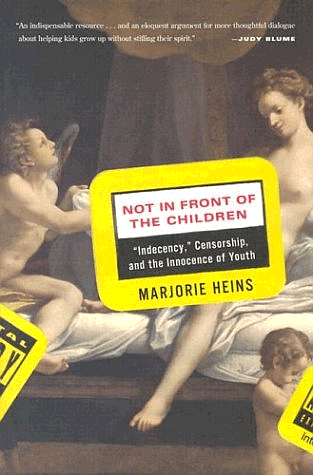
Abb.: Einbandtitel einer Publikation {Wenn Sie
HIER klicken, können Sie dieses Buch bei amazon.de
bestellen}
"The National Coalition Against Censorship (NCAC), founded in 1974, is an alliance of 50 national non-profit organizations, including literary, artistic, religious, educational, professional, labor, and civil liberties groups. United by a conviction that freedom of thought, inquiry, and expression must be defended, we work to educate our own members and the public at large about the dangers of censorship and how to oppose them. " [Quelle: http://www.ncac.org/about/about.html. -- Zugriff am 2005-03-21]
Webpräsenz: http://www.eff.org/. -- Zugriff am 2005-03-10
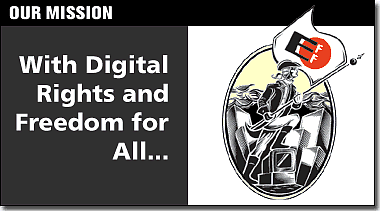
Abb.: Our Mission©
Instead, a modern group of freedom fighters was necessary to extend the original vision into the digital world.
That's where the Electronic Frontier Foundation comes in.
Just as Patriots fought for liberty and freedom, we fight measures that threaten basic human rights. Only the dominion we defend is the vast wealth of digital information, innovation, and technology that resides online.
The Electronic Frontier Foundation is a group of passionate people — lawyers, technologists, volunteers, and visionaries — working in the trenches, battling to protect your rights and the rights of web surfers everywhere. The dedicated people of EFF challenge legislation that threatens to put a price on what is invaluable; to control what must remain boundless.
Electronic Frontier Foundation: Because being able to share ideas and information is the reason the Web was created in the first place!
[Quelle: http://www.eff.org/mission.php. -- Zugriff am 2005-03-10]
EFF initiierte die Blue Ribbon-Kampgne:

Join the Blue Ribbon Online Free Speech Campaign!
Webpräsenz: http://www.abffe.org/. -- Zugriff am 2005-03-21.
"The American Booksellers Foundation for Free Expression is the bookseller's voice in the fight against censorship. Founded by the American Booksellers Association in 1990, ABFFE’s mission is promote and protect the free exchange of ideas, particularly those contained in books, by opposing restrictions on the freedom of speech; issuing statements on significant free expression controversies; participating in legal cases involving First Amendment rights; collaborating with other groups with an interest in free speech; and providing education about the importance of free expression to booksellers, other members of the book industry, politicians, the press and the public." [Quelle: http://www.abffe.org/about.htm. -- Zugriff am 2005-03-21]
Zu Kapitel 6: Apokalyptische Außenpolitik